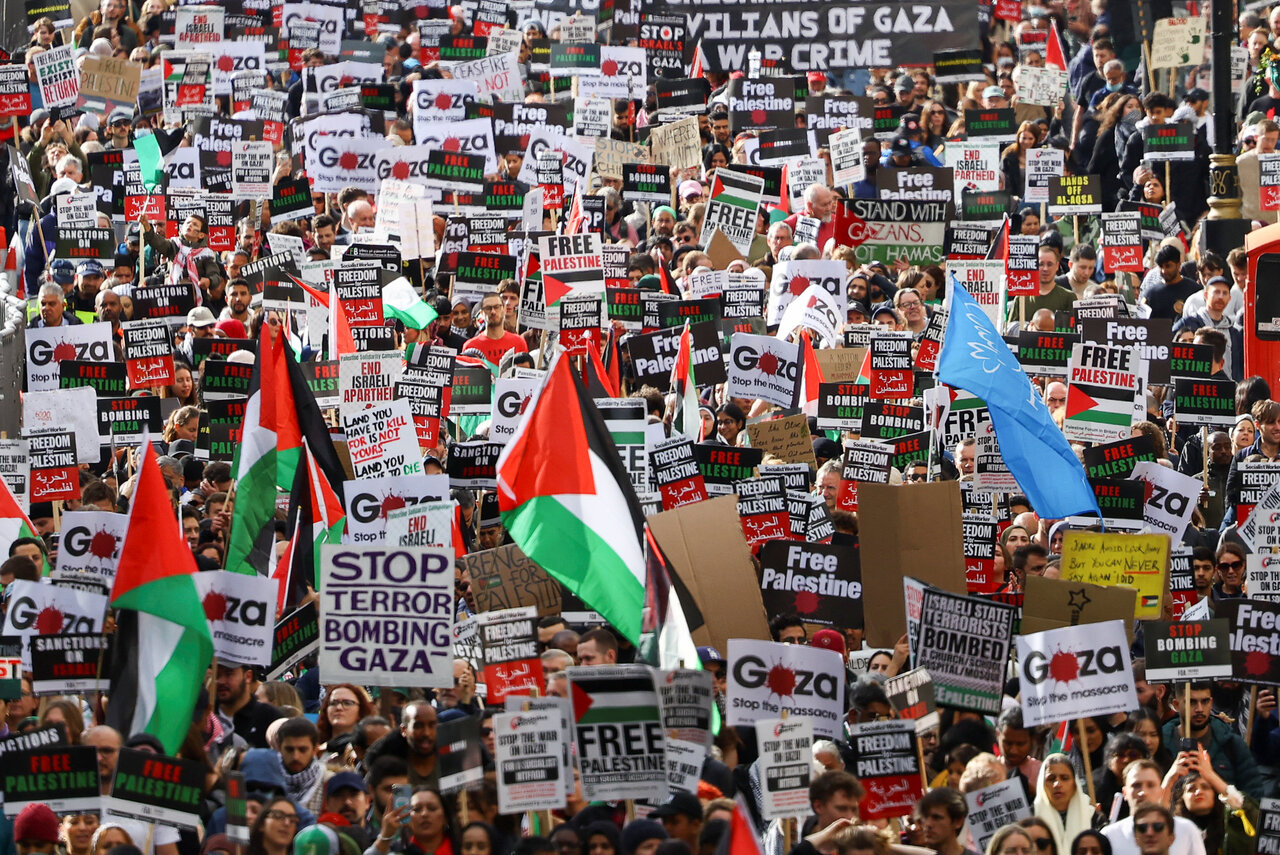Global public support for Gaza leaves Western leaders on edge
Protests in solidarity with Palestinians have unnerved pro-Israel leaders in the West

Not since the run-up to the U.S.-led invasion of Iraq in 2003 has there been such a global public outcry at an armed conflict that Western leaders are adamant, on this occasion, to turn a blind eye toward.
Weekly protests around the world denouncing the Israeli atrocities in Gaza and demanding a ceasefire now have put pressure on supporters of the regime, in essence, Western leaders to reshape their PR campaign towards the indiscriminate Israeli war on Gaza.
The tone of the public stands very controversially opposite to the position of some Western governments.
And like the protests in the run-up to the invasion of Iraq just over two decades ago, many of the weekly demonstrations in solidarity with Gaza have been in the West itself, something that has unsettled its politicians.
After the Palestinian resistance waged the al-Aqsa Storm Operation on 7 October last year, Western leaders, in particular U.S. President Joe Biden, followed the next day by British Prime Minister Rishi Sunak, traveled to Tel Aviv to pave the way for the Israeli regime to pound the entire Palestinian populations in the besieged Gaza Strip and destroy its civilian infrastructure.
On arrival back home, the two leaders regurgitated the same Israeli propaganda to the public to justify the regime's bombardment of the Gaza Strip. Other Western leaders did the same.
But the public back home was not buying it.
The regime's death and destruction campaign against 2.3 million Palestinians living in the besieged enclave with "genocidal intent", was already being seen through the eyes of the American and British people before South Africa had to argue the case in The Hague on Thursday.
The non-stop demonstrations in the Western world, most notably in the U.S. and Britain, in support of the Gaza Strip, since the Israeli regime launched its indiscriminate attacks against Gazans, including women and children, have seen Western leaders change their political rhetoric in public.
This can be seen in Western government statements that have called for more aid to address the humanitarian crisis in the enclave.
In a bid to satisfy the public outcry, Western diplomats have told the media that they have relayed their alleged concern over the lack of aid entering Gaza during bilateral meetings with Israeli officials. However, they are still falling short of calling for a ceasefire.
That has not stopped the mass outpour of anger on the streets of major cities across the U.S. and its closest allies in the West, in particular the UK.
One element that has worried Western governments is that mass protests back home are not being staged solely by people of West Asian ethnicity.
To make matters worse, Caucasian protesters are appearing on TV screens, and Caucasian activists leading the rallies.
This hurts the political leaders who are well aware they have lost the support of nationals of West Asian ethnicities in upcoming elections. But losing the support of white voters as well, over the Israeli war on Gaza, is a double whammy.
Opinion polls show that the younger generation in the United States, where there have been hundreds of protests in solidarity with Gaza since the Israeli war began, is growing more sympathetic to the Palestinians than ever before.
The trend is worrying for the U.S. establishment as the young generation is growing to understand the Palestinian cause for justice while at the same time growing disturbingly opposed to the occupation.
In an ideal world, Western governments, led by the U.S. administration, would address the calls of those voicing their anger on the streets, but this is where Zionist lobbies in the West come into the picture.
Such is their influence and power over politicians in the United States and the United Kingdom, to the extent that the Democratic party in Washington and the Conservative party in London are pretty much powerless in showing any conscience to call on the Israeli regime to halt the fire.
Congress is wary that calling on the Israeli regime to halt its war could have dire consequences.
Halting fire is on par with accepting a defeat by the occupation regime.
Accepting defeat in the current climate could spell the end of the U.S. hegemony in West Asia.
It explains why only the U.S. vetoes UN Security Council resolutions calling for a ceasefire and why the United Kingdom follows suit or abstains.
The longer the regime commits heinous crimes against civilians in Gaza, the more public sympathy will rise with the Palestinians.
It spells bad news for Western leaders, particularly those in the United States, who are trying their best to protect their number one destabilizing proxy in West Asia. Still, they are paying a heavier price with each passing day.
After largely failing to paint the pro-Palestinian and anti-Israeli street marches as being antisemitic, as many U.S. and British politicians along with their mainstream media attempted to do, Washington and its Western friends sought the only other method they knew best.
The U.S. resorted to suppressing pro-Palestinian voices in America. Artist David Velasco found out the hard way after being fired for signing an open letter along with thousands of artists, scholars, and cultural workers calling for "Palestinian liberation".
The U.S. establishment can and has threatened these activists, but what it is incapable of is silencing the mass crowds peacefully taking to the streets.
Leave a Comment